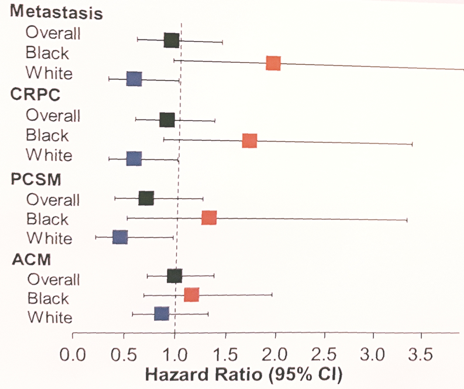For this study, the authors utilized the SEARCH database to identify 570 prostate cancer patients initiating ADT for disease recurrence after radical prostatectomy. The SEARCH database is made up of several Veterans Affairs Medical Centers in the US, and includes information on patient age at the time of surgery, race, height, weight, clinical stage, grade of cancer on diagnostic biopsies, preoperative serum PSA value, surgical specimen pathology (specimen weight, tumor grade, tumor volume, stage and surgical margin status), and follow-up serum PSA data. Statin use prior to ADT, metastasis, castration-resistant prostate cancer (CRPC), prostate cancer-specific mortality (PCSM) and all-cause mortality (ACM) data were abstracted from electronic medical records. The authors used Cox proportional hazards analysis to examine associations between statin use prior to ADT and risk of metastasis, CRPC, PCSM and ACM, adjusting for demographic, clinical and pathologic characteristics, overall and stratified by race.
Among the 570 men included in the study, 308 (54%) were statin users prior to ADT initiation, of which 42% of the overall cohort was black. Median follow-up among men who did not experience any event was 60 months (IQR 34-112). Statin users were older at ADT (65 vs. 63 years; p=0.004) and had a higher body mass index (p<0.001), but pathologic tumor characteristics did not vary significantly by statin use (all p>0.08). In the overall cohort, statin use was not associated with risk of metastasis, CRPC, PCSM, or ACM on either univariable or multivariable analysis (all p>0.2). However, univariable analysis in white men revealed significant inverse associations between statin use and risk of metastasis (HR 0.57, 95%CI 0.33-0.98), CRPC (HR 0.58, 95%CI 0.34-0.99) and PCSM (HR 0.46, 0.22-0.96), with no significant associations in black men.

Adjusting for pathologic characteristics did not affect the direction or magnitude of these findings. The strength of the current study is the use of the SEARCH database, with its minority-rich cohort of patients to develop a sample size large enough to test associations between statin use and prostate cancer specific outcomes, stratified by race. A limitation is the retrospective nature and the inherent biases associated with population-based, treatment centered studies. Allott concluded that statin use was associated with improved outcomes in prostate cancer patients undergoing ADT, but only among white men. Future studies are needed to explore biologic and non-biologic mechanisms that may contribute to the role of cholesterol and statins in prostate cancer, specifically with regards to differences in racial outcomes.
References:
1. Jespersen CG, Norgaard M, Friis S, et al. Statin use and risk of prostate cancer: A Danish population-based case-control study, 1997-2010. Cancer Epidemiol 2014;38(10):42-47.
2. Allott EH, Howard LE, Cooperberg MR, et al. Serum lipid profile and risk of prostate cancer recurrence: Results from the SEARCH database. Cancer Epidemiol Biomarkers Prev 2014;23(11):2349-2356.
3. Larsen SB, Dehlendorff C, Skriver C, et al. Postdiagnosis statin use and mortality in Danish patients with prostate cancer. J Clin Oncol 2017;35(29):3290-3297.
Presented by: Emma Allott, Ph.D., The University of North Carolina at Chapel Hill
Co-Authors: Lauren Howard, Durham, NC, William Aronson, Los Angeles, CA, Martha Terris, Augusta, GA, Christopher Kane, San Diego, CA, Christopher Amling, Portland, OR, Matthew Cooperberg, San Francisco, CA, Stephen Freedland, Los Angeles, CA
Written by: Zachary Klaassen, MD, Urologic Oncology Fellow, University of Toronto, Princess Margaret Cancer Centre at the 2018 AUA Annual Meeting - May 18 - 21, 2018 – San Francisco, CA USA